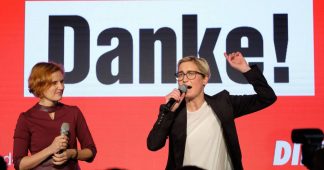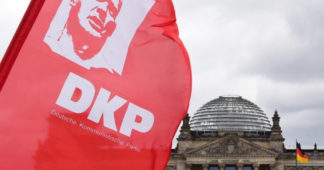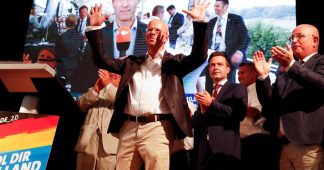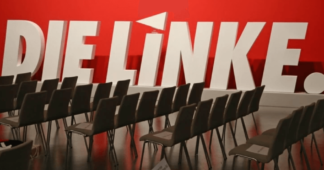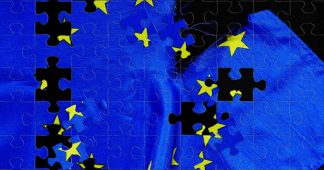By Herman Michiel (*)
20 October 2021
In the Bundestag elections of 26 September, Germany’s left party Die Linke achieved a dire result. Some 2.3 million people voted for the party, 2 million fewer than in 2017. According to analysts, of these 2 million, 820,000 would have voted for the social-democratic SPD, 610,000 for the Grünen (Greens) and 520,000 would not have voted.
The score of 4.9% of the votes cast was just under the 5% electoral threshold, but because there were still three directly elected candidates (via the German system of the separate election of one mandate per electoral district, the so-called Erststimme), the threshold did not apply according to electoral law. The Left Party will still be represented in the Bundestag with 39 elected members, which is 30 fewer than before. Traditionally, the electoral centre of gravity of Die Linke does lie in the former GDR, and in Thuringia and Mecklenburg-Western Pomerania it did indeed still achieve more than 11% (and 8.5% in Brandenburg), but the average of 9.8% for the five ex-GDR Länder is only half the result of 2017. The far-right Alternative für Deutschland (AfD) does lose somewhat, but remains very strong in eastern Germany.
Election results of left-wing parties, anywhere in Europe or beyond, leave no left-wing soul untouched. When it concerns the most important member state of the European Union (EU), developments there can also have a broader meaning. One should also see this in the ‘questioning’ phase in which just about every left-wing party finds itself at the moment. What strategy to adopt in a generally neoliberal context in which the right, and increasingly the far right, appear to be thriving? There are attempts in a left-populist direction, such as Podemos in Spain. In France, Mélenchon tries to charm the voter with a state-sovereignist narrative. The Dutch SP seems to want to protect the welfare state from evil influences with a kind of national hedgehog attitude. As far as Die Linke is concerned, there are different currents present, with different ideas about what the party should do. But in the end, it was a limited group of the leadership that made the eagerness to participate in government its electoral showpiece.
In what follows we will successively discuss the opinion of the Die Linke leadership, of different currents within the party and finally of left-wing commentators and organisations outside the party.
The Die Linke leadership
At the party conference in spring 2021, with a view to the Bundestag elections of the autumn, the Left Party elected a new party council (Parteivorstand, 44 members) and a two-person presidency, the female duo Janine Wissler and Susanne Hennig-Wellsow. Wissler was seen as representing the more left wing, while Hennig-Wellsow was considered a “realist” who was aiming for government participation, in the Länder and if possible in the Federal Republic itself. However, the election campaign was led by a small team, and the party council did not meet for the duration of the campaign.
Two “Spitzenkandidaten” (key candidates) stood in the limelight: party chairperson Janine Wissler and Dietmar Bartsch, Linke speaker at the Bundestag. Although the election manifesto expressly states that participation in a government that engages in privatisations, the reduction of social security benefits and public services is out of the question, the campaign was dominated by Die Linke’s readiness for government. Participation in the government would be in the context of a red-red-green (‘rrg’) coalition (SPD – Grüne – Die Linke). The supporters of this option within Die Linke saw themselves strengthened by the high scores the Grünen received in the polls for a while, and later as the SPD made a remarkable advance and overtook the Christian Democratic CDU/CSU. The “government left” saw its chance, and in early September, three weeks before the elections, launched a watered-down version of the election programme, the “Sofortprogramm” (‘emergency programme’). The ‘objectionable’ points of the agreed election programme that stood in the way of a possible ‘rrg’-coalition, according to the SPD and its Spitzenkandidat Scholz, had been removed. This mainly concerns the rejection by the Left of NATO and the deployment of German soldiers abroad. At the presentation of the Sofortprogramm, Bartsch said that “the best thing for the world, Europe and Germany would be a centre-left coalition”.
If the intention of a red-red-green coalition had ever existed outside Bartsch’s and others’ heads, it was of course no longer possible once the election results became known. Also arithmetically, rrg does not get a majority. However, the protagonists of government participation and the Sofort programme do not appear to be striking a mea culpa. Hennig-Wellsow sees “no contradiction between government work and movement politics”; after all, it does not help “to stand at the garden fence and make a few comments”. In future, Die Linke must “make it clear that we are a modern left-wing party that is prepared to take responsibility.” Wissler, the party’s other co-chair, was known not to be a big supporter of rrg, but apparently she did not think it was appropriate to intervene on the subject.
Gregor Gysi, for his part (one of the three directly elected members and figurehead of Die Linke in eastern Germany), disputes that the debacle has anything to do with Die Linke’s government ambitions (“only its opponents think so”). The whole discussion about NATO irritates him; “the dissolution of NATO is not in our election programme” [1].
For Dietmar Bartsch, it is not the election campaign as such that is the reason for the debacle, but the cause lies deeper, among others in the divisions of the party that often came to the surface. The Left MEP Martin Schirdewan also regrets that there is now no majority for a “progressive alternative in which the Left could have made social corrections”. This statement from the mouth of the co-president of the United Left in the European Parliament has a wider scope than just German…
There are further indications that the advocates of government participation are not drawing lessons from their premature ambitions. In an article in Sozialismus dated 6 September, the day the Sofortprogramm appeared, Joachim Bischoff and Gerd Siebecke write enthusiastically about the desirability of a ‘progressive coalition’. Three weeks later, in the same magazine, they discussed the election results and pointed to several real problems in Die Linke, but there was no mention of the wayward behaviour of the campaign leadership and its government obsession.
There was an initial discussion on 2-3 October within the party council, which met for the first time since its election in February. Of course, there was no in-depth analysis yet. There was quite a bit of discontent when Bartsch left the meeting after only a short time. The report of the debates would also not sufficiently address the discussion of government participation as the core of the campaign. Everyone agrees that the party has been dealt a heavy blow and that there needs to be a thorough debate on where to go with Die Linke. The parliamentary downsizing also has financial consequences; three million euros less in income must be taken into account.
We will now go through some of the reactions from the different currents within Die Linke.
Socialist Left (SL)
The Sozialistische Linke (SL) is a current within Die Linke that presents itself also as the ‘trade union-oriented current’ and the ‘left centre of the party’. It is aimed at ‘left-wing socialist, left-wing social democrat and reform communist’ members and is said to have about 800 members.
Already on 1 October, the SL had a comprehensive position on the ‘catastrophic’ election result. One might expect that, from a trade union point of view, the pursuit of concrete results in the field of social policy would tend to come as close as possible to the state system. However, this is not the case. SL states very clearly: governing on the left is only possible if the conditions are right. There has to be a dynamic in society that supports our views, “also in distinction to possible coalition partners“. SL clearly does not believe that this dynamic was present, and regrets that there was no more offensive position towards SPD and Grünen on all kinds of issues (taxes, pensions, austerity policy, defence, foreign policy, Afghanistan…).
The Socialist Left also thinks that the party does not aim enough at working people, the unemployed, pensioners and people with a low level of education (“A party only for academics?”). According to analyses, SPD and Grünen gained trade unionists, whereas Die Linke lost voters there.
According to SL, Die Linke must become a ‘mass socialist party’, anchored among young and old, in urban and rural areas, among natives and migrants. To achieve this, the interests of the majority must be put centre stage. There must be room in the party for ‘ordinary people’, not just activist radicals.
SL does not elaborate on the role of the controversial Sahra Wagenknecht. On the one hand, there is the believe that personalities are important for a party, and Wagenknecht is perhaps the best known face of Die Linke. But on the other hand, with ‘Aufstehen’ (a failed attempt to set up a movement around or outside Die Linke), the publication of a controversial book during the election campaign and self-serving statements, she caused division within the party and confusion outside it. In an accounting consideration, SL believes that Wagenknecht led more people into the party on net than out.
Marx21
This is a Marxist circle around the magazine of the same name; unlike the Sozialistische Linke, it is not an officially recognised current within the party. Some 300 members are said to support the initiative.
In seven ‘theses’ (available in English here), Marx21 points in the first place to the attempt to form a red-red-green coalition, and to deny the actual party programme for this. “By attempting to form an electoral front with SPD and Grünen, the party lost the opportunity to attack them aggressively.” Marx21 recognises that many people want a different kind of government, and that the party must respond to this; the possibility of participating in a left-wing government should not be excluded, but this must be done on the basis of defending a left-wing programme, not by swallowing criticisms already during the campaign.
Marx21 also rejects the idea, strongly emphasised by Sahra Wagenknecht, that the party has moved too far away from the ordinary worker and pensioner, and focuses too much on migration, racism, ecology, etc.
The fifth these raises an important, often underexposed point. As Fig. 2 illustrated, the electoral debacle is mainly located in the former East Germany. Another statistic (Fig. 3) confirms this: in the East, the party’s membership is systematically declining, whereas in the West it has recovered and is almost back to its 2007 level.
Marx21 also notes that participation in government is no guarantee for social policy. The state of Bremen is governed by a coalition of the rrg, but there, during the pandemic and with the support of the Die Linke, 440 beds in state hospitals were scrapped. And in 2002, Berlin was governed by an SPD-Left coalition, which was responsible for the privatisation of 70,000 flats.
For Marx21, the conclusion is that Die Linke should make a new start (‘reboot’) and not consider opposition as something useless. The party must become the engine of resistance and counter-power.
Anti-capitalist Left (akl)
The akl, which is said to have about a thousand members, is officially recognised within the party and is open to a variety of left-wing views, including non-party members. It is critical of parliamentarianism and distinctly antimilitaristic (Tobias Pflüger is a well-known spokesman of it, but was not re-elected).
At the party council on 3 October, Thies Gleiss expressed the view of akl. The electoral campaign, aimed at forming a ‘left-wing government’ at all costs, was a break with the party programme. Bartsch’s motto, “we must get the SPD out of its CDU captivity”, amounted to campaigning for the SPD. This confused many voters, many of whom then voted for SPD or Grünen. The analysis made by akl- North Rhine-Westphalia (the most populous federal state) states that the social side of climate politics was not sufficiently highlighted, that there was no campaigning against Hartz4 [reform of the labour market decided by the SPD-Grünen under Schröder, implying harsher treatment of unemployed] and that the campaign was one-sidedly focused on the figure of Sahra Wagenknecht; she and five others were elected in NRW, but that is only half of what it was in 2017.
Somewhat related to akl is the Kommunistische Plattform (KPF), also anti-capitalist and anti-militarist, but less critical of the GDR’s Stalinist past. In a brief reaction to the elections, KPF points to the cautiousness with which SPD and Grünen were treated by the campaign leaders, who made participation in government the main objective. The fact that party positions on NATO and the use of the Bundeswehr were forgotten in the process was also a step too far for KPF, of course. The question is also raised whether such a willingness to compromise on military matters would not be extended by voters to doubts on the firmness of the party on social issues.
Bewegungslinke
The Bewegungslinke (‘movement left’) was only founded in 2018, but the movement is strongly represented in the current party council. They want to form a bridge between the party and extra-parliamentary movements (but did not support Sahra Wagenknecht’s Aufstehen movement).
In an analysis of the election result, the defeat is mainly seen as an expression of the crisis in which the party finds itself. “We have to ask ourselves fundamental questions: what was wrong in the party of the past, what should the party of the future look like?” There is no discussion of the government-oriented campaign, but rather extensive considerations on Die Linke’s past history. It was formed as a fusion between a strong eastern pole, the PDS (Party of Democratic Socialism) and ‘disillusioned SPD members’ in the West. Its initial success was based mainly on the eastern pole, but it has since been weakened, among other things by an ageing electorate. On the other hand, new members have poured in in recent years, often young people from anti-racist and other movements, climate activists, people in foster care. The party has not adapted sufficiently to this; the challenge now is to give birth to a ‘new party’.
* * *
If we consider together the reactions of the rather diverse currents within Die Linke, all of them (with the possible exception of the Bewegungslinke) disagree with the tenor of the campaign which was almost unconditionally aiming for a coalition with SPD and Grünen. Isn’t that a bold observation? The moment a party makes its most conspicuous public appearance, it is least led by its representative bodies. As mentioned, the party council did not meet even once during the campaign; the approved party programme was simply replaced by the ‘Sofortprogramm’ by the campaign management… But this is a shortcoming that is not only found in Die Linke. In the British Labour Party it is standard practice, and actually in all bourgeois and social-democratic parties the members have little or no say in election campaigns and the party line in general.
In this respect, Die Linke is certainly not the worst. The fact that organised currents are allowed to operate means that different points of view can be presented. In this context, it is striking that – despite the fact that internal disagreements are highlighted from various sides as a negative in the party’s public appearance – this does not lead to pleas for the abolition of diversity. The left-wing youths expelled from the Dutch SP can only dream of that! Perhaps party militants of Die Linke should have been more assertive as soon as the election campaign took its government turn. And couldn’t the party council have intervened earlier, not waiting till after the election results?
The swift and committed reactions to the electoral debacle also indicate more commitment to the party than is often the case elsewhere. The anti-capitalist Left, for example, points out that the overall election result cannot be interpreted as a decline of the Left in German society; SPD and Grünen together gain more votes than Die Linke loses. If the voters’ expectations of a different policy remain unfulfilled under the future government, the need for a real left-wing alternative will become clearer, according to akl. The resounding success of the Berlin referendum to expropriate property speculators also shows that broad sections of the population are receptive to radical measures.
Reactions outside the party
One does not have to be an (active) member of a party to hope for its progress, and to worry otherwise. Reactions to the electoral defeat of Die Linke from movements, committed academics and individual voters prove that a lot of people put their hope in Die Linke.
A few days after 26 September, a series of leading peace activists issued a joint statement expressing their disappointment at the course taken by the party’s anti-militarist positions. Their conclusion: there is only one alternative: hard, consistent and programme-driven opposition work as the only way back to political identity and credibility with the electorate.
In the German edition of Jacobin, Klaus Dörre, professor of sociology in Jena, gives his view on Die Linke’s downfall. The party should have played a leading role in the main task of our time, a radical change towards sustainability, it had a good programme on the subject, but there was nothing to be heard or seen in the public performance. This was also the case in relation to NATO and foreign action; the party was the only one at the time to oppose participation in the military intervention in Afghanistan, an issue that was widely discussed during the election campaign. But because of the red-red-green obsession, nothing was heard of this either.
The party’s credibility was also badly affected by party conflicts that came to the fore in abundance. Wagenknecht accused the party of turning away from ordinary people [and in April 2021 published a book with the subtitle “My counterprogramme”], but headed the list in North Rhine-Westphalia… And when she links the defence of the welfare state to criticism of migration, like the Danish Social Democrats, she does a very disservice to a party that stands for anti-racism and solidarity. Oskar Lafontaine, for his part, had openly called for not voting for Die Linke, because of his conflict with the list leader in Saarland. For Dörre it is clear: “Instead of working together in a left-wing mosaic in which many currents have their place, the party comes across as a collection of fighting sects, each of which thinks it has the truth.”
Another sociology professor, the well-known Wolfgang Streeck, also comments extensively on the German elections, but about Die Linke, he says only that the party is “deeply divided internally” and “on the verge of heading for insignificance”. That is very little for an author who is otherwise never shy of a sharp comment. As one of the best known supporters of Sahra Wagenknecht’s Aufstehen movement, some reflection on this would not have been inappropriate.
The economic geographer Christian Zeller (Univ. Salzburg) discussed the Sofortprogramm in detail in Sozialistische Zeitung as soon as it appeared in early September. “With SPD and Grünen for a socio-ecological political revolution, really?” he titled a piece that made firewood of the idyllic image of the left-wing coalition that would take a new path on climate, corona-fighting and disarmament under the good care of Die Linke.
These are just a few reactions from outside the party itself, and there are certainly views that defend the ‘realistic’ course of the campaign leadership. Nevertheless, one has the impression that there is still a considerable left critical potential in Germany that will weigh on the period of reflection that has now opened within Die Linke. One can only hope that the bitter experience of 26 September will trigger more fundamental insights into what a left-wing party should be and do.
And what should a left-wing party do?
A fundamental question to which there is no ‘right’ answer. But let us consider this. First of all, successes or failures in election campaigns are not the absolute criterion for the correctness of strategy for a radical left-wing party. Insofar as the party sees its raison d’être in the pursuit of a different, socialist society, civil elections are only one of the attempts to win people over to the alternative project. Whoever fights for this project must put the best assets on the table. They are there, and this also became apparent in the German context. Only Die Linke opposed NATO’s policy from the outset. Only Die Linke makes the connection between the capitalist mode of production and the climate catastrophe that is looming. And only Die Linke has consistently opposed the humanitarian and political scandal that is Fortress Europe. These are the trump cards of an anti-capitalist party, but they are of no use if they are not played out in the name of an imagined ‘left front’ in which one would only be the laughing stock.
Notes
(*) Herman Michiel is the editor of the Flemish-Dutch website Ander Europa.
[1] Page 137 of the election programme: “We demand the dissolution of NATO and its replacement by a collective security system under the participation of Russia, with disarmament as a central objective”. In addition, the election programme states that Die Linke “in every political configuration” and irrespective of whether or not Germany withdraws from NATO, will stand up for the withdrawal from NATO’s military structures and the abandonment of its supreme command.
We remind our readers that publication of articles on our site does not mean that we agree with what is written. Our policy is to publish anything which we consider of interest, so as to assist our readers in forming their opinions. Sometimes we even publish articles with which we totally disagree, since we believe it is important for our readers to be informed on as wide a spectrum of views as possible.



